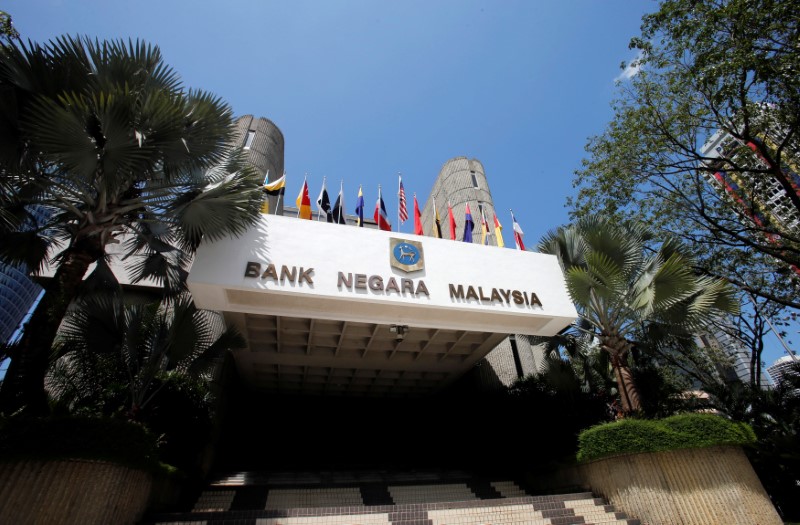 © Reuters. FILE PHOTO – A general view of the headquarters of Malaysia’s central bank, Bank Negara Malaysia, in Kuala Lumpur
© Reuters. FILE PHOTO – A general view of the headquarters of Malaysia’s central bank, Bank Negara Malaysia, in Kuala LumpurBy Praveen Menon
KUALA LUMPUR (Reuters) – Malaysia’s central bank left its key interest rate unchanged on Wednesday, after hiking it for the first time in over three years in January, as easing inflationary pressures and solid growth gave it room to hold off further tightening for now.
Bank Negara Malaysia (BNM) kept the overnight policy rate (OPR)
“At the current level of the OPR, the degree of monetary accommodativeness is consistent with the policy stance to ensure that the domestic economy continues on a steady growth path amid lower inflation,” BNM said in a statement.
The committee will continue to monitor and assess the balance of risks surrounding the outlook for domestic growth and inflation, BNM added.
In its January review, BNM said it saw the need to take pre-emptive measures to prevent a build-up of risks from leaving interest rates low for a prolonged period of time.
A stronger economy allowed BNM to go through with what was a widely expected hike at the time – well ahead of the national election that is set to be a bitter fight between Prime Minister Najib Razak and his one-time mentor and a former premier Mahathir Mohamad.
The Malaysian economy grew 5.9 percent last year, while the ringgit has appreciated by about 15 percent from end-2016, making it one of the best performing currencies in Asia.
The bank said the appreciation of the ringgit better reflected the economic fundamentals.
CORE INFLATION TO MODERATE
Growth is expected to remain strong this year, with domestic demand being the key driver. Inflation is projected to average lower in 2018 with a stronger ringgit exchange rate compared to 2017 mitigating import costs, BNM said.
It also noted that core inflation would moderate due to labor productivity and investments for capacity expansion.
“The central bank’s expectation of moderating core inflation suggests it will hold (the key rate) for the rest of H1 2018,” said Trinh Nguyen, a senior economist at Natixis in Hong Kong.
Headline inflation eased to 2.7 percent in January, the slowest in a year, after peaking at 5.1 percent in March 2017.
However, some analysts say BNM could hike rates later this year after the elections that must be held by August.
“We forecast the next 25 basis points OPR hike in the third quarter of 2018, once the political uncertainty … lifts,” Prakash Sakpal, an ING economist, said in a note ahead of the rate decision.
Fusion Media or anyone involved with Fusion Media will not accept any liability for loss or damage as a result of reliance on the information including data, quotes, charts and buy/sell signals contained within this website. Please be fully informed regarding the risks and costs associated with trading the financial markets, it is one of the riskiest investment forms possible.
Source: Investing.com
























